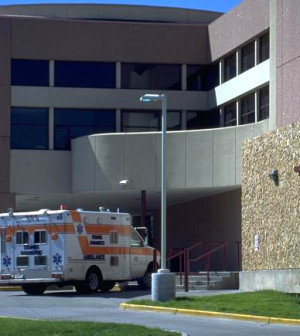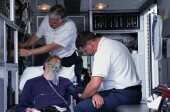- Could Artificial Sweeteners Be Aging the Brain Faster?
- Techniques for Soothing Your Nervous System
- Does the Water in Your House Smell Funny? Here’s Why
- Can a Daily Dose of Apple Cider Vinegar Actually Aid Weight Loss?
- 6 Health Beverages That Can Actually Spike Your Blood Sugar
- Treatment Options for Social Anxiety Disorder
- Understanding the Connection Between Anxiety and Depression
- How Daily Prunes Can Influence Cholesterol and Inflammation
- When to Take B12 for Better Absorption and Energy
- Epsom Salts: Health Benefits and Uses
911 Best Call for Heart Attack Victims in Rural Areas: Study


Many rural residents with severe heart attacks drive or are driven to the hospital, but they have a better chance of survival if they call 911, a new study finds.
Researchers looked at 774 people in rural Minnesota, North Dakota and South Dakota who suffered a severe type of heart attack in 2013 and 2014. Fifty-two percent of them arrived at the hospital in their own vehicles, rather than calling 911.
The average time it took to get to the hospital was 38 minutes for patients who traveled in their own vehicles and 26 minutes for those brought by ambulance.
The average time it took from arriving at the hospital to receiving heart artery-opening treatment was 57 minutes for those who traveled in their own vehicles and 42 minutes for those who arrived by ambulance.
The study was published April 29 in the American Heart Association (AHA) journal Circulation: Cardiovascular Quality and Outcomes.
“The biggest implication is raising awareness so the public understands the vital role of EMS [emergency medical services] in health care,” study author Dr. John Gallagher, EMS Medical Director of the Winona Area Ambulance Service in Minnesota, said in an AHA news release.
“EMS continues to be viewed as only a ‘ride,’ but utilizing EMS as part of the health care system not only allows for treatment from the time they arrive at your door, but also has been proven to shorten time to [heart attack] treatment faster,” he added.
The researchers did not look at why heart attack patients drove their own vehicles to the hospital instead of calling 911.
“The public needs to start seeing EMS as the first access point to health care. Their unique capabilities to deliver lifesaving care en route to the hospital should not be underestimated. The benefits of 20 minutes saved in their heart attack timeline are huge,” Gallagher said.
More information
The U.S. National Heart, Lung, and Blood Institute has more about heart attack.
Source: HealthDay
Copyright © 2026 HealthDay. All rights reserved.










